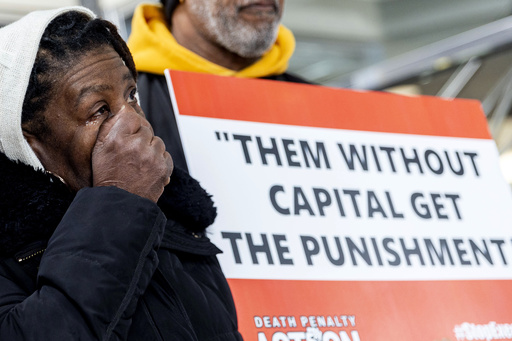MONTGOMERY, Ala. — On Friday, a federal judge declined to halt what would mark the fourth execution using nitrogen gas in the United States, stating that the inmate failed to demonstrate that this method constitutes cruel and unusual punishment under the law.
Chief District Judge Emily C. Marks dismissed Demetrius Frazier’s plea for a preliminary injunction that sought either to prevent his scheduled execution on Thursday in Alabama or mandate that the state administer a sedative before executing him with gas.
In her ruling, Judge Marks indicated that Frazier did not satisfy the stringent legal standard required to secure an injunction. She stated, “Frazier fails to meet his burden to establish that the Protocol does create a substantial risk of serious psychological pain such that the Protocol violates the Eighth Amendment.”
Frazier is set to be executed for the 1991 murder of Pauline Brown, a crime that involved breaking into her Birmingham apartment, attacking her, and shooting her fatally.
Alabama was the pioneer in executing inmates by nitrogen gas in 2024, when three individuals were executed using this method. The process entails fitting a gas mask on the prisoner’s face, which replaces breathable air with pure nitrogen, resulting in death due to the lack of oxygen.
Frazier’s legal team highlighted accounts of the state’s first three executions via nitrogen to argue that the process led to a prolonged and distressing suffocation, contradicting the state’s claims of a swift death.
Dr. Brian McAlary, an anesthesiologist who was present during the November execution of Carey Dale Grayson, testified that he noticed clear evidence of distress in Grayson, claiming that the inmate appeared conscious for as long as three minutes.
Media witnesses also reported observing the prisoners shaking on the gurney as their executions commenced.
Judge Marks countered that these descriptions fail to substantiate a claim that any of the inmates experienced “severe psychological pain or distress beyond what is inherent in any execution.” The state argued that the movements could have been involuntary or simulated.
Nonetheless, she acknowledged that a situation could arise where subjecting an inmate to oxygen deprivation while conscious might violate constitutional protections.
“Despite the State’s insistence at the hearing to dismiss this notion, the longer an inmate remains conscious while inhaling nitrogen during execution, the more probable it is that the Eighth Amendment could be breached,” Marks articulated.
Prior to his conviction in Alabama, Frazier had been sentenced to life imprisonment in Michigan for the 1992 murder of a 14-year-old girl. Michigan does not impose the death penalty.
In a desperate move, Frazier’s mother pleaded with Michigan’s Governor Gretchen Whitmer, requesting that she intervene to transfer Frazier back to Michigan to serve his life sentence instead of facing execution in Alabama.
“Please bring my son back to Michigan. Please don’t let Alabama kill my son if you can stop it,” Carol Frazier urged in her letter to the governor.
However, Whitmer’s office chose not to comment on the matter.
Copyright @2024 | USLive | Terms of Service | Privacy Policy | CA Notice of Collection | [privacy-do-not-sell-link]



